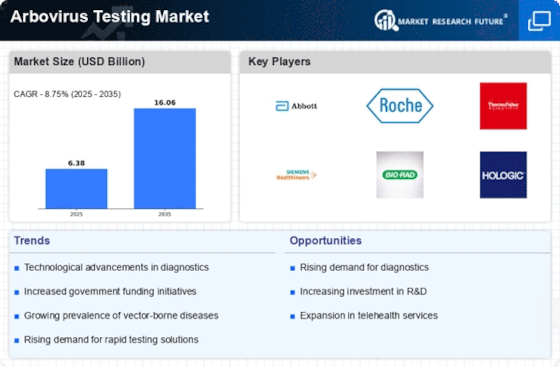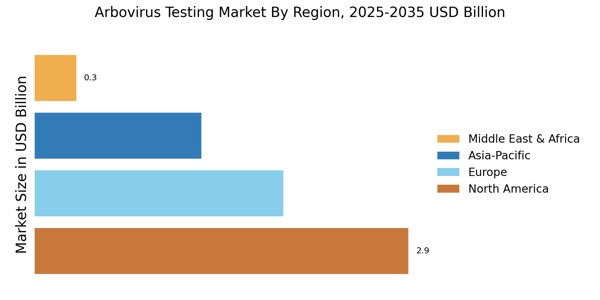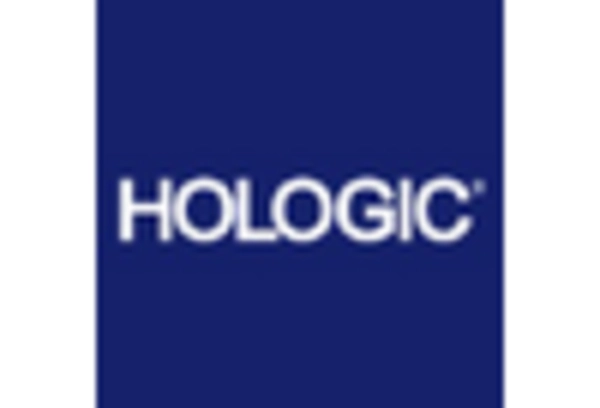Government Initiatives and Funding
Government initiatives aimed at controlling arboviral diseases are significantly influencing the Arbovirus Testing Market. Many countries are allocating substantial funding for research and development of testing methods and public health campaigns. For example, initiatives to enhance vector control and surveillance programs are being implemented to reduce the transmission of arboviruses. This financial support not only fosters innovation in testing technologies but also encourages collaboration between public health agencies and private sector entities. As governments prioritize the establishment of robust testing frameworks, the Arbovirus Testing Market is likely to benefit from increased investments and resources dedicated to combating these infectious diseases.
Rising Incidence of Arboviral Diseases
The Arbovirus Testing Market is experiencing growth due to the rising incidence of arboviral diseases such as dengue, Zika, and chikungunya. These diseases have shown a concerning increase in prevalence, particularly in tropical and subtropical regions. For instance, the World Health Organization has reported a significant rise in dengue cases, with millions of infections annually. This surge necessitates effective testing solutions to manage outbreaks and ensure public health safety. Consequently, healthcare providers and governments are investing in advanced testing technologies to enhance disease surveillance and response strategies. The demand for accurate and rapid testing methods is likely to drive the Arbovirus Testing Market forward, as stakeholders seek to mitigate the impact of these diseases on populations.
Advancements in Diagnostic Technologies
Technological innovations are playing a pivotal role in shaping the Arbovirus Testing Market. The development of molecular diagnostic techniques, such as PCR and next-generation sequencing, has revolutionized the speed and accuracy of arbovirus detection. These advancements enable healthcare professionals to identify infections more rapidly, which is crucial during outbreaks. Moreover, the integration of point-of-care testing devices is enhancing accessibility to testing in remote areas. As a result, the market is witnessing an influx of new products that cater to diverse testing needs. The increasing adoption of these advanced diagnostic technologies is expected to propel the Arbovirus Testing Market, as they provide reliable solutions for timely disease management.
Growing Demand for Preventive Healthcare
The shift towards preventive healthcare is becoming increasingly evident within the Arbovirus Testing Market. As awareness of arboviral diseases rises, individuals and healthcare providers are emphasizing the importance of early detection and prevention strategies. This trend is leading to a higher demand for testing services, as proactive measures are recognized as essential in managing public health risks. Additionally, the integration of testing into routine health check-ups is gaining traction, further driving the market. The focus on preventive healthcare is expected to sustain the growth of the Arbovirus Testing Market, as stakeholders seek to implement comprehensive strategies to reduce the burden of arboviral diseases.
Impact of Climate Change on Disease Patterns
Climate change is emerging as a critical factor influencing the Arbovirus Testing Market. Alterations in temperature and precipitation patterns are expanding the habitats of mosquito vectors, thereby increasing the risk of arboviral disease transmission. Research indicates that regions previously unaffected by these diseases are now experiencing outbreaks, necessitating enhanced testing capabilities. As public health officials strive to adapt to these changing dynamics, the demand for effective arbovirus testing solutions is likely to rise. This evolving landscape underscores the importance of continuous monitoring and testing, positioning the Arbovirus Testing Market as a vital component in addressing the challenges posed by climate change on public health.

















